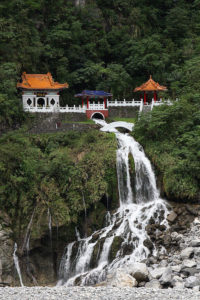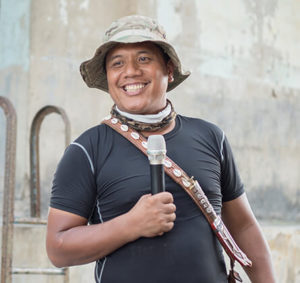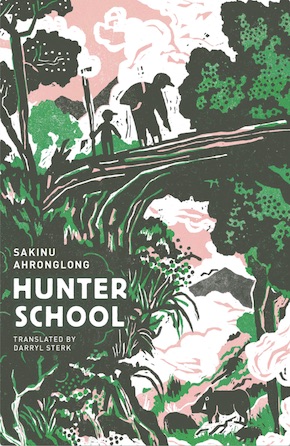The hunter who crossed a continent
by Sakinu AhronglongThe last hunter in the village of Lalaoran, which in my dialect of Paiwanese means “the first ray of dawn’s light”, has pairs of hand and feet that were given to him by the ancestors, and he has wisdom that helps him coexist with the mountain. When I was a boy, what I liked to do most of all was watch him carrying his machete. At the time I kept telling myself, I hope someday that I can be as valiant and courageous as him! Who is he you ask? None other: my dad.
“Your father,” my grandfather once told me, “was born in the wrong generation. If he had been born in the past, he would have been an amazing hunter. All the tribespeople would have respected him.” But no longer. Father’s skills and abilities as a hunter no longer win him the esteem of the tribespeople. Our mountain culture has disappeared, almost.
Father, with his hunter’s intuition, is the last walking embodiment of our ancestral wisdom – the crystallization of generations of experience of the mountains.
Times have changed – the environment is not the same. Our village has been invaded by an alien culture, causing traditional society to fall apart. The traditional institutions have all but vanished. Traditionally, we had a moral code that taught us restraint, but now that is mostly gone. We no longer follow the way of life of our ancestors. And as foreign culture has come in, indigenous people have gone out.
From the 1950s to the 1970s, no matter which group they belonged to, indigenous people in Taiwan left their homes to go to different distant places to make a living. They left the place that their ancestors had been living in for generations. All the mountains had to offer was no longer enough to satisfy the needs of the people. At the time in the factories and on the oceangoing fishing vessels, you’d find indigenous people. You’d find indigenous people working any other kind of low-wage, low-class job. That’s the kind of job that indigenous people did. From my first memory, my father was seldom at home. To support his family, he went to work as a migrant worker in Saudi Arabia. He worked a spell in Taipei after he came back to Taiwan, but in the end, he couldn’t get used to life in the big city. Finally, to try to resolve the struggle in his soul, the contradiction in his body and mind from which he suffers along with every member of his generation, he came back to the place where he belonged. The place that belonged to him.
Once you have made friends with the mountains, you’re friends with the mountains for life. You become a hunter not just in order to feed your family but in order to better understand the mountains and the life of nature.”
He often sighs and says, “The only place that feels alive to me is right here! Only when I can see the mountains and the animals that live there on a daily basis do I feel alive. We are mountain folk. And you know, you can take the man out of the mountains but not the mountains out of the man. Once you have made friends with the mountains, you’re friends with the mountains for life. You become a hunter not just in order to feed your family but in order to better understand the mountains and the life of nature. But times have changed, and we don’t want to be mountain folk anymore, or hunters.” In saying this, my father specifically meant the indigenous people in Taiwan who traditionally live close to the mountains and who rely on the mountains to make a living, for not all the indigenous people lived in the mountains and not all were hunters. Some lived on the plains, and some fished by the sea.

Traditional Paiwan slate dwellings in Heito (Pingtung), dismissed as “savages’ houses” in this Japanese-era print from 1938. Wikimedia Commons
“One day I will be old,” he said, “and I will no longer be able to catch the mountain boar, or sharpen my machete. When that time comes, who in the village community will want to become a true man of the mountains?”
Now the alpine forests are getting smaller and smaller, and I don’t know where all the animals have gone. The hunting grounds have been taken away by the Bureau of Forestry. We are not allowed to hunt anymore. Their rules have left my father hog-tied, so he can no longer follow his instincts.
Once we had our own rules which guided our instincts. There’s a saying in Mandarin, that we indigenous people “kao shan chih shan”. Kao means ‘lean on’ or ‘live near’, shan is ‘mountain’, and chih is ‘eat’. I think you get the idea. We don’t eat the mountain, but we depend on it for our food. That’s how it’s always been. Our ancestors tell us that survival means having respect for nature, that’s our main rule for keeping the life of the tribe going. We have to treat nature with humanity, just like we would treat a friend. It’s like the relationship between family members.
Now the Han Chinese people from the plains have cut down all the big trees in the mountains and they have planted cash crops. The forests where the mountain boars once ran have now turned into orchards for tangerines. And the plains where muntjacs and river deer once pranced have now become golf courses for big shots. Tea plantations today might in the past have seemed heaven on earth for ants and bees and other bugs and of course monkeys to play in. But today the land is overused, and animals do not have a forest anymore. They have lost their living room, their space of survival. Land development, also known as degradation, has led to the extinction of animals. The sound of the mudfish in the pond and the frogs in the mud has disappeared. And the blame has been put on the indigenous people. People say that hunting is stealing. People accuse us of cutting down trees to build our homes and whittle our handicrafts. People say that by passing on our cultural philosophy we are destroying the natural ecology. They accuse us of stealing natural resources that belong to the nation. When the government promotes sustainability and emphasizes ecological resources, they seem to have forgotten that in the traditions of the indigenous people there is the notion that all things have life and that we should treat them fairly and humanely. Respecting ecology has always been a part of our daily lives.
“We are mountain folk,” my father says, “and from the moment we lost our own mountain forest everything changed. In the past when we went hunting, we did it according to the changes in the seasons. We did not go hunting every day.”
This is how my grandfather put it: “If you take the bow out every day, then when will the male and female animals have time to fall in love and make love and have children? Sakinu, look, from the past to the present, everywhere there are indigenous people there are green expanses. Anywhere plains people have settled there are no trees. Mountain people do not even need to plant trees because trees will naturally grow by our sides. People on the plains plant trees for all kinds of different reasons, but the trees they plant have no life. Our trees have life and power and they grow very tall and big.” The things that my father and grandfather told me made me deeply aware of how closely related indigenous people are with the life of nature.
When I was young, my father often took me up the mountain to go hunting. Over mountain after mountain – that’s how you get strength in your legs. At the time, I had a lot of questions about the mountains. When my father lost his patience he would say, “Quit asking so many questions, you likucu! Chatterbox! Just be quiet and listen. If you listen, then you will hear… People will talk to you and sing to you, and you will hear the sound of their breathing.” It took me a long time to understand what my father was trying to tell me.
But I think I eventually got it, and now, from time to time, I will talk to stones or trees and sing to them. It’s fun. There, up the mountain, I never feel lonely. Because in my heart, I know that I have a lot of friends to play with, who’ll sing with me and dance with me. When I got tired from walking, Father would stop, have a smoke, and let me rest.
When I was resting, he would tell me stories about nature. One thing he said really made an impression on me, it was unforgettable. “It’s the same with creatures,” he said, “they have to rest and sleep, like you. When they are tired, they take a nap. We cannot make a lot of noise and disturb them. We have to let the mountain’s healing power take effect. That’s why, when a man is sick, everything in the mountains will help him get well.”
In the past, no matter who came to rule over the island of Taiwan, they had no way of keeping us from enjoying things that belonged to us.”
He said only mountain folk, who make the mountains their home, can truly understand what this means. This was the beauty of my father’s wisdom and experience of the mountains. There is no distance between the indigenous people and the mountains, just like father and son.
That’s how it used to be, but there’s been a change in the environment that has led to indigenous people leaving the forests and hunting grounds they lived in for generations.
The way we lived in the past – nobody asked about it or interfered with it. Nobody said, “That’s not right,” or, “You can’t do that.” In the past, no matter who came to rule over the island of Taiwan, they had no way of keeping us from enjoying things that belonged to us. My grandfather said, “When China came (by which he meant when the Kuomintang fled to Taiwan in 1949), they trapped us with their laws, they snared us with their rules saying, ‘You can’t do this,’ and ‘You can’t do that.’ And now we have lost the forests that belonged to us and the hunting grounds and the rivers and the places that we cultivated for generations.”
He meant that we’ve lost our space of existence and survival. That the traditional lifestyle we lived in the past cannot continue to be passed on. It cannot continue to develop. We cannot even build traditional houses on our own land. We have never gotten the respect we deserve. Our rights and living space have never been protected.

Changchun (Eternal Spring) Shrine, Taroko National Park, Central Mountain Range, Taiwan. Twice destroyed by landslides since first built in 1958, the current structure dates from 1989. AngMoKio/Wikimedia Commons
This is what the elders in the village say: “This space belongs to us. Why don’t we have the right to use it? We were here a long, long time ago. Before the laws of China had been invented, we’d been living here for many generations.” We are not familiar with the rules of the game of the people of the plain. They can’t use their laws to say that we indigenous people are in the wrong. They have no right to interfere with our lifestyles on the mountain. Who is it destroying ecology by farming and mining excessively, often illegally, extracting too much from the land? Who is it who is driving the animals away? The blame for the extinction of the animals has been placed on people like my father. We tribespeople bear a heavy burden of injustice!
No wonder my father has been struggling inside himself – no wonder he’s a walking contradiction. Some cultural practices he will insist on passing down, and some he will oppose strenuously. No wonder, given his life history.
But I believe that the blood of the mountains has always flowed in my father’s veins, as well as a certain feeling for the mountains. Now, he just does what he wants. Mountain folk today all go to the plains to make money, like my father once did, and nobody wants to go back to his ancestral place, like my father’s done.
There’s no contradiction in me: only I continue in the footsteps of our ancestors, searching for nature and things that belong to me and the Paiwan people. Although the nation has taken away our ancestral forests and our hunting grounds and planting plots, the nation cannot take away my feet. I can go wherever I want. And when I feel tired from walking, I sit on a rock and I drink from a mountain stream. At night, I sleep on the ground just like my ancestors did. I feel like the richest person in the world. The plainspeople from China brought the legal notion of land title. Well, my father often jokes, “It used to be that if a Paiwan person had walked through a place leaving footprints with his own two feet enough times, that place belonged to him.”
My father is happy to be a mountain man, it gives him an ineffable satisfaction and pride.
—
Having written all this, I feel very moved by my father’s commitment to the mountains. Everything in nature is his friend. I write about culture with my pen, but my father writes about culture with his feet and his machete. In this way, he is the closest to truth and to nature and to the mountains. Now he uses his machete to write his own life history. He uses his feet to follow in the footsteps of our ancestors. By following the natural rules of the mountains, he uses his hands to continue the ancestral arts.
I still like to listen to my father tell stories about the mountains and look at him, his machete at his waist. As his eldest son, I feel like it’s my responsibility to write stories about the mountains and about him, and if I didn’t, it would be a pity. And I would feel guilty. From him, I have heard and seen and learned a lot of traditional things. If I do not record these things, then it would be a great loss for my village of Lalaoran.
From Hunter School (Honford Star, £10.99)
 Sakinu Ahronglong is an aboriginal Taiwanese author who became instantly famous for his debut book Hunter School, a work of fiction consisting of recollections, folklore, and autobiographical stories from the perspective of an aboriginal Taiwanese man aiming to reconnect with his lost tribal identity. Winning the 2000 Wu Yung-fu Literature Prize and other awards, it was adapted for the film The Sage Hunter, released in 2005. He is also a forest ranger and runs an educational programme for other aboriginal Taiwanese who want to connect with their tribal culture. Hunter School, translated by Darryl Sterk, is published by Honford Star in paperback and eBook.
Sakinu Ahronglong is an aboriginal Taiwanese author who became instantly famous for his debut book Hunter School, a work of fiction consisting of recollections, folklore, and autobiographical stories from the perspective of an aboriginal Taiwanese man aiming to reconnect with his lost tribal identity. Winning the 2000 Wu Yung-fu Literature Prize and other awards, it was adapted for the film The Sage Hunter, released in 2005. He is also a forest ranger and runs an educational programme for other aboriginal Taiwanese who want to connect with their tribal culture. Hunter School, translated by Darryl Sterk, is published by Honford Star in paperback and eBook.
Read more
@honfordstar
Darryl Sterk is a Canadian translator based in Hong Kong, where he teaches translation at Lingnan University, and Taiwan. His translation of The Stolen Bicycle by Wu Ming-Yi was longlisted for the 2018 Man Booker International Prize. As a scholar, he researches translation to and from the Taiwanese indigenous language Seediq.


